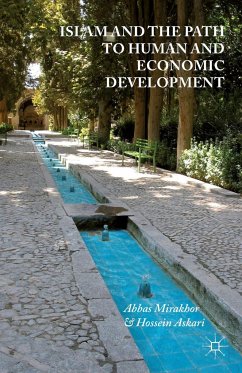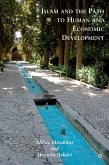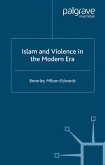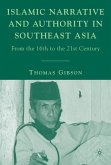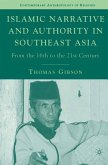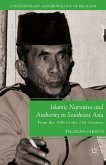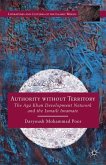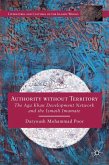This book briefly surveys the evolution of the Western concept of development, recognizing the wider dimensions of human and economic development and the role of institutions and rules, which has moved toward the vision and the path of development envisaged in Islam.
Hinweis: Dieser Artikel kann nur an eine deutsche Lieferadresse ausgeliefert werden.
Hinweis: Dieser Artikel kann nur an eine deutsche Lieferadresse ausgeliefert werden.
"Islam and the Path to Human and Economic Development represents a path-breaking attempt at conceptualizing a genuine Islamic paradigm for developing societies. It succeeds where prior attempts have failed because it combines a vast knowledge of the subject with a coherent intellectual vision and a deeply felt passion. The book is destined to be the standard work in the area for years to come." - Robert Looney, Distinguished Professor, Naval Postgraduate School
"The authors critique the approaches to development associated with classical theory of Adam Smith and the more recent growth theories of the twentieth century from an Islamic perspective, stressing that development should not only be measured in terms of material advance, but rather in human terms, both in terms of personal development and the recognition of both social responsibility and ultimately accountability to the Almighty. The book is likely to be essential reading for courses on Islamic economics, which are increasingly offered at universities in North America and Europe, as well as of course in the Muslim world." - Rodney Wilson, Professor, School of Government and International Affairs, Durham University
"Abbas Mirakhor and Hossein Askari have written a pioneering and profoundly significant work. Their work combines academic rigor, a thorough understanding of the evolution of economic and social theory and policy in the western world, together with remarkably fresh insights into the moral and spiritual universe of Islam and its significance to the outer world of material achievement. It is in the way that they have woven the spiritualized precepts of Islam into the articulation of an alternative understanding of the nature, meaning and purposes of economic development that sets this work apart. In the process Mirakhor and Askari have set markers for a new field of inquiry in economic development.
The great achievement of Askari s and Mirakhor s work is that they have brought back the great spiritual traditions of Islam right into the heart of the debate on economic development. Mirakhor s and Askari s work is truly path-breaking and deserves to be recognized as such." - Ali Allawi, Fellow, Carr Center, Harvard University, and author of Crisis of Islamic Civilization, Yale University Press
"This is a heart-warming book, which brings together the concept of holistic economic development and Islamic economic thought to create a new much needed paradigm shift in global economic development. This insightful book will provide a fresh perspective to economists, Islamic bankers, NGO s, Civil Servants, and individuals across the world who want to build a fairer and better world for all." - Iqbal Khan, CEO Fajr Capital and former founding CEO of HSBC Amanah
"For very understandable reasons, treatises on Islamic Economics, Islamic Finance, Islamic Law, Islam and Terrorism, and so on have proliferated in recent years. Most of these treat individual aspects of particular Islamic institutions and/or behavior, and many are highly critical of the institutions observed in the contemporary world of so-called Islamic countries. Abbas Mirakhor and Hossein Askari are no doubt equally critical of what they see in these Islamic countries. But, what they do in Islam and the Path to Human and Economic Development is radically different. They take full advantage of the prophet Mohamed s own words and beautifully expressed teachings to argue that the Islam of the Quran and of the Prophet provides a coherent, balanced and comprehensive framework upon which to build well-functioning societies, even today. If the institutional framework of the Quran and the Prophet is used as the foundation of such societies, not only will capital - both physical and human - and technology accumulate, so as to yield sustainable growth, but human development goals and social harmony will be achieved as well. This comprehensive framework would make for a low transactions cost world in which strong social norms would greatly reduce the need for bureaucracies and enforcement infrastructure and the likelihood of dictatorships. The authors provide their readers with an impressive tour through much of intellectual history, eloquently highlighting the unique contributions of the Prophet s institutional infrastructure." - Jeff Nugent, Professor of Economics, University of Southern California
"In the current atmosphere where Islamic fundamentalist ideology has taken hold of Islam in general and has seriously undermined intellectual activity in particular, it is crucial for scholars to undertake studies not limited by apologetic and dogmatic trends. The present volume is the result of such a genuine analytical study, and it demonstrates the value of independent research unhampered by the reactionary currents of contemporary Islam. Mirakhor and Askari present an in-depth study of the institutional structure of development in Islam from an intellectual perspective. By examining a wide range of Islamic structural forms from the Quran and the life and example of the Prophet to the contemporary ones, they provide a road map to development encompassing the domains economic and human for the modern Muslim society. The authors demonstrate that in principle Islam does not limit the institution of development, but Muslims must allow for change to become integrated in the processes that unfold before us in the modern world so that development may become an institution." - Hossein Ziai, Professor of Islamic and Iranian Studies, University of California, Los Angeles
"An enlightening, rigorous explication of Islam and its relevance to economic development, Islam and the Path to Human and Economic development is a must read for all interested in enhancing their understanding of Islam, the evolution of economists view on development, and the moral foundation for economic progress." - Donald Losman, Professor of Economics, Industrial College of the Armed Forces
"The authors critique the approaches to development associated with classical theory of Adam Smith and the more recent growth theories of the twentieth century from an Islamic perspective, stressing that development should not only be measured in terms of material advance, but rather in human terms, both in terms of personal development and the recognition of both social responsibility and ultimately accountability to the Almighty. The book is likely to be essential reading for courses on Islamic economics, which are increasingly offered at universities in North America and Europe, as well as of course in the Muslim world." - Rodney Wilson, Professor, School of Government and International Affairs, Durham University
"Abbas Mirakhor and Hossein Askari have written a pioneering and profoundly significant work. Their work combines academic rigor, a thorough understanding of the evolution of economic and social theory and policy in the western world, together with remarkably fresh insights into the moral and spiritual universe of Islam and its significance to the outer world of material achievement. It is in the way that they have woven the spiritualized precepts of Islam into the articulation of an alternative understanding of the nature, meaning and purposes of economic development that sets this work apart. In the process Mirakhor and Askari have set markers for a new field of inquiry in economic development.
The great achievement of Askari s and Mirakhor s work is that they have brought back the great spiritual traditions of Islam right into the heart of the debate on economic development. Mirakhor s and Askari s work is truly path-breaking and deserves to be recognized as such." - Ali Allawi, Fellow, Carr Center, Harvard University, and author of Crisis of Islamic Civilization, Yale University Press
"This is a heart-warming book, which brings together the concept of holistic economic development and Islamic economic thought to create a new much needed paradigm shift in global economic development. This insightful book will provide a fresh perspective to economists, Islamic bankers, NGO s, Civil Servants, and individuals across the world who want to build a fairer and better world for all." - Iqbal Khan, CEO Fajr Capital and former founding CEO of HSBC Amanah
"For very understandable reasons, treatises on Islamic Economics, Islamic Finance, Islamic Law, Islam and Terrorism, and so on have proliferated in recent years. Most of these treat individual aspects of particular Islamic institutions and/or behavior, and many are highly critical of the institutions observed in the contemporary world of so-called Islamic countries. Abbas Mirakhor and Hossein Askari are no doubt equally critical of what they see in these Islamic countries. But, what they do in Islam and the Path to Human and Economic Development is radically different. They take full advantage of the prophet Mohamed s own words and beautifully expressed teachings to argue that the Islam of the Quran and of the Prophet provides a coherent, balanced and comprehensive framework upon which to build well-functioning societies, even today. If the institutional framework of the Quran and the Prophet is used as the foundation of such societies, not only will capital - both physical and human - and technology accumulate, so as to yield sustainable growth, but human development goals and social harmony will be achieved as well. This comprehensive framework would make for a low transactions cost world in which strong social norms would greatly reduce the need for bureaucracies and enforcement infrastructure and the likelihood of dictatorships. The authors provide their readers with an impressive tour through much of intellectual history, eloquently highlighting the unique contributions of the Prophet s institutional infrastructure." - Jeff Nugent, Professor of Economics, University of Southern California
"In the current atmosphere where Islamic fundamentalist ideology has taken hold of Islam in general and has seriously undermined intellectual activity in particular, it is crucial for scholars to undertake studies not limited by apologetic and dogmatic trends. The present volume is the result of such a genuine analytical study, and it demonstrates the value of independent research unhampered by the reactionary currents of contemporary Islam. Mirakhor and Askari present an in-depth study of the institutional structure of development in Islam from an intellectual perspective. By examining a wide range of Islamic structural forms from the Quran and the life and example of the Prophet to the contemporary ones, they provide a road map to development encompassing the domains economic and human for the modern Muslim society. The authors demonstrate that in principle Islam does not limit the institution of development, but Muslims must allow for change to become integrated in the processes that unfold before us in the modern world so that development may become an institution." - Hossein Ziai, Professor of Islamic and Iranian Studies, University of California, Los Angeles
"An enlightening, rigorous explication of Islam and its relevance to economic development, Islam and the Path to Human and Economic development is a must read for all interested in enhancing their understanding of Islam, the evolution of economists view on development, and the moral foundation for economic progress." - Donald Losman, Professor of Economics, Industrial College of the Armed Forces

